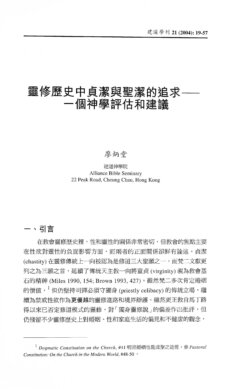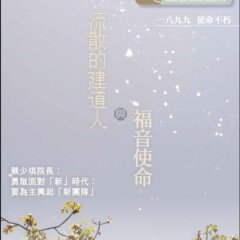靈修歷史中貞潔與聖潔的追求──一個神學評估和建議/廖炳堂
撮要
在靈修歷史裡,教會的焦點主要放在性欲對靈性的負面影響,鮮有論述兩者的正面關係。雖然自馬丁路得以來更正教已否定修道模式的靈修,但「獨身靈修說」理論框架下的種種性觀念,今天不但在天主教仍是主導思想,就算在更正教裡,它的影響其實並未散盡。
新約時期的猶太人承傳了舊約時代對彌賽亞的期待,對生育和性的價值基本上是肯定的。早期教會因婚姻乃神所創立而不致否定它的正面價值,但不少教父受希臘宇宙論的影響,認為性行為是墮落後才有的表現。既然性事屬於墮落後多於創造時的秩序,宗教改革前的教會對性事的意義普遍都看得很負面,包括婚內性事。
更正教雖然重新以創造和人本質角度肯定婚姻和性事的正面價值,而加爾文和清教徒更開始從愛的角度詮釋性事,可惜仍擺脫不了上中古教會傳統將強烈性欲定性為墮落失序的觀點,從而淡化了將之看為「一體」之愛的正面教導;此外他們也延續了中古教會對性事諸般禁戒,使加爾文「忠貞之愛」和羅傑斯「心靈感通」的正面性神學失去更大發展的機會。
作者強調性事的積極神學意義需要在神聖婚盟(marital covenant)中才得以顯明,它主要有三方面的向度:第一,關係向度:性事雖因墮落而受污染,但它本屬創造之秩序,首要意義是為夫妻在婚姻內「成為一體」賦與一本體的基礎,在這個意義下,致力長期維繫美滿的婚姻和性生活不單不是縱欲,更是愛的操練。第二,醫治向度:婚姻制度的兩性、排他和終身形態都詮釋性事的本質,使人的自私和性欲得約束、醫治和更新,恆常的性生活可以提醒夫妻雙方由性入愛,不斷學習婚約之愛的忠貞和委身等等特質。第三,生產力向度:性基本上是建立愛的關係的原始動力,神聖的性合一經驗可以產生超越自我中心的愛,從家人伸延到家庭以外的人,這合一的愛成為家庭、教會和社群生活的基礎和理型。
筆者希望本文可以為強調性正面價值觀的性教育和愛的教育提供基礎性的歷史和神學反省。
ABSTRACT
In the history of spirituality, the church focused more on the negative influence of sex upon one’s spiritual life and neglected its potential positive contribution. Although Protestants have rejected the monastic approach to spirituality since Martin Luther, some negative views of coitus derived from Celibate Spirituality are still influential today not only in Catholic but also in Protestant teachings.
Jewish people in New Testament age inherited the Old Testament expectations for the Messiah and their attitudes towards propagation and sex were basically positive. The early church respected the value of marriage as a divinely ordained institution, but many early church fathers, under the influence of Greek cosmology, understood sexual intercourse as a fallen human behavior. Since sex was regarded as something of the fallen order rather than the creation order, the pre-Reformation church was generally very negative towards the meaning of coitus, even within marriage.
After the Reformation, Protestants generally adopted the perspectives of sexuality as a gift of creation to affirm the value of marriage and sex. In addition, Calvin and Puritans began to understand marital sex in terms of love. Yet Protestants still carried over the medieval view that strong sexual drive is a fallen disorder. The meaning of coitus as the embodiment of the marital loving union was downplayed. Furthermore, they inherited also many medieval restrictions and taboos about marital coitus. Certain promising themes of a positive theology of sex were thus overshadowed and did not have opportunities for further elaboration. These included Calvin’s view that “faithful marriage is the second species of virginity,” and the Daniel Rogers’ view that “marital love and sex is a sweet compound of nature and religion.”
原載於《建道學刊》21期(2004年1月),頁19-57。
作者簡介
廖炳堂
副院長(學術)








